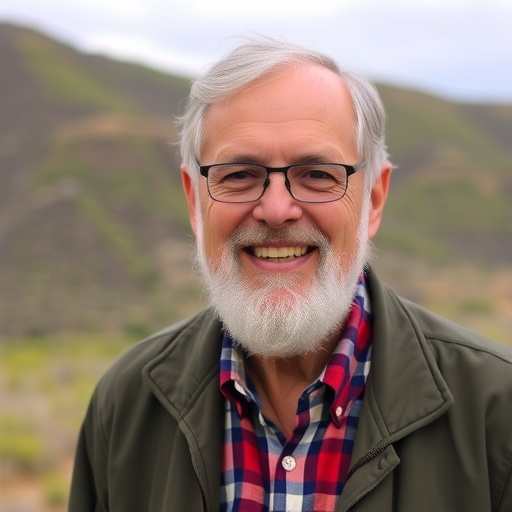Richard Gordon, distinguished as the W.M. Keck Foundation Professor of Geophysics at Rice University’s Department of Earth, Environmental and Planetary Sciences, has been honored with the prestigious 2025 Walter H. Bucher Medal by the American Geophysical Union (AGU). This accolade celebrates his groundbreaking contributions to the foundational understanding of the Earth’s crust and lithosphere, continuing a legacy of excellence exemplified by previous recipients since the award’s establishment in 1966.
The Walter H. Bucher Medal is awarded annually to a single scientist whose original research fundamentally advances knowledge about the Earth’s tectonic behavior. It commemorates Walter Hermann Bucher, a former AGU president renowned for his influential studies on tectonic processes. Being a recipient places Gordon among an elite cadre of geoscientists whose work has profoundly influenced the comprehension of lithospheric dynamics.
Richard Gordon’s research career spans almost five decades, during which he has notably reshaped the understanding of tectonic plate interactions. His pioneering identification and elucidation of diffuse plate boundaries challenged the conventional paradigm that deformation is confined to narrow faults, revealing instead regions where strain distribution is broadly dispersed. This insight into deformation mechanics has deepened scientific perspectives on plate tectonics and seismic hazard assessment.
A key aspect of Gordon’s work involves the phenomenon of true polar wander, an intriguing geophysical process wherein the entire Earth undergoes a reorientation relative to its spin axis. By studying the shifting of Earth’s mass distribution, Gordon’s research provides crucial insight into the planet’s rotational stability and internal dynamics, which has implications for paleogeographic reconstructions and the interpretation of geodetic data.
Moreover, he introduced the concept of “paleomagnetic Euler poles,” an innovative computational method that deduces the historical motion of tectonic plates relative to Earth’s spin axis. This approach leverages paleomagnetic data to reconstruct ancient plate trajectories, furnishing a powerful tool for understanding the long-term evolution of Earth’s lithosphere beyond contemporary geodetic observations.
Gordon’s influence extends beyond theoretical developments through his leadership in creating globally accepted plate motion models. The NUVEL (Northwestern University velocity) and MORVEL (mid-ocean ridge velocity) models that he spearheaded have become essential frameworks for seismic risk analyses, geodynamic simulations, and Earth system science research, offering refined estimates of relative plate velocities that underpin modern tectonic investigations.
Educationally rooted in a Ph.D. in geophysics from Stanford University attained in 1979, Gordon’s academic journey included a 15-year tenure at Northwestern University before his longstanding appointment at Rice University starting in 1995. His multidisciplinary research integrates marine geophysics, paleomagnetic studies, space geodesy, geodynamic theory, and advanced numerical modeling, collectively amplifying the granularity and scope of investigations into lithospheric processes.
Throughout his career, Gordon has garnered multiple distinguished awards, reflecting the profound impact of his research. These honors include the AGU’s James B. Macelwane Medal, Geological Society of America’s Arthur L. Day Medal and Woollard Award, and the European Geosciences Union’s Stephan Mueller Medal. Additionally, several of his publications have been lauded as landmark contributions, underscoring the historical significance of his scientific output.
Gordon expressed immense gratitude upon receiving the Walter Bucher Medal, describing the recognition as an extraordinary honor that positions him alongside luminaries whose work he deeply admires. He emphasized the ongoing nature of geophysical inquiry, highlighting the myriad lingering mysteries about Earth’s dynamic systems and his commitment to advancing understanding in collaboration with emerging scientists.
The American Geophysical Union, as the preeminent global organization dedicated to Earth and space sciences, annually distinguishes leaders who have propelled research, education, and science communication forward. The Bucher Medal award ceremony will be part of the AGU Fall Meeting scheduled for December 15-19, 2025, in New Orleans—a gathering themed “Where Science Connects Us” designed to celebrate achievements that unify and inspire the international geoscience community.
This recognition cements Richard Gordon’s status as a pivotal figure in contemporary geophysics. His work not only enriches theoretical frameworks but also directly influences applied geosciences, including seismic hazard assessment, geodynamic modeling, and paleoenvironmental reconstructions, thereby shaping scientific discourse and practical understanding of Earth’s tectonic architecture.
As tectonic and geophysical research faces fresh challenges with the advent of new technologies and expanding data, Gordon’s contributions provide a foundational platform upon which future discoveries will be built. His innovative methodologies and comprehensive models form an integral part of the toolkit available to researchers unraveling the complexities of Earth’s lithosphere and its interactions with underlying mantle processes.
In conclusion, the awarding of the Walter H. Bucher Medal to Richard Gordon signifies both a celebration of past achievements and an endorsement of the continuing quest to decode Earth’s tectonic mysteries. His pioneering spirit and influential scholarship inspire confidence that deeper insights into the planet’s internal mechanisms are well within reach, with wide-ranging implications for science and society.
Subject of Research: Geophysics, Tectonic plate dynamics, Earth’s crust and lithosphere
Article Title: Richard Gordon Awarded 2025 Walter H. Bucher Medal for Pioneering Contributions to Earth’s Tectonics
News Publication Date: Not specified
Web References:
Image Credits: Rice University
Keywords: Geophysics, Plate tectonics, Diffuse plate boundaries, True polar wander, Paleomagnetic Euler poles, NUVEL model, MORVEL model, Tectonic plates, Lithosphere, Earth dynamics, Space geodesy, Geodynamics




